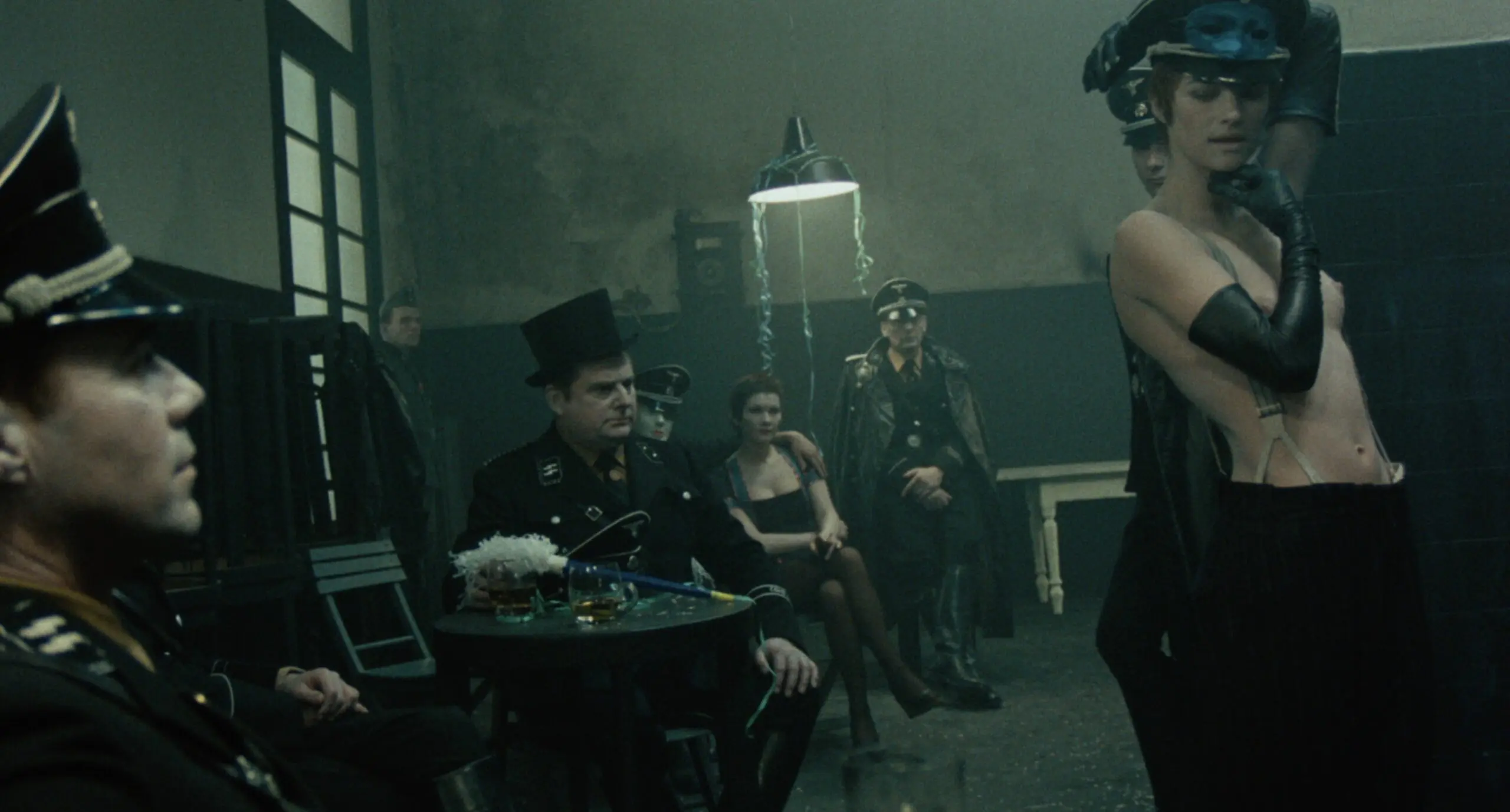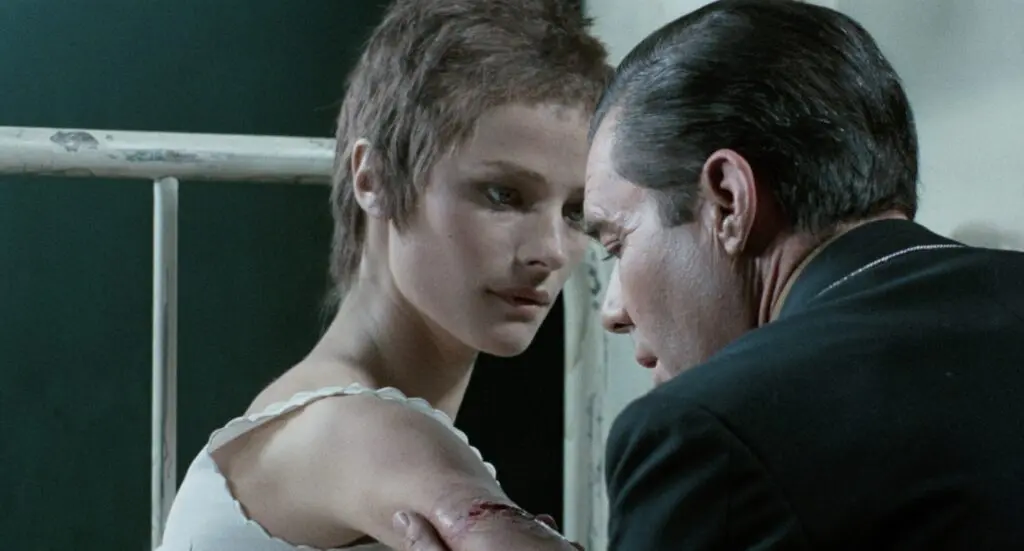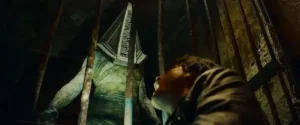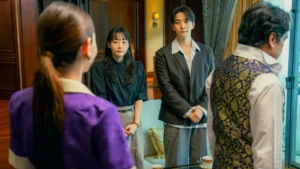Summary
A beautiful, horrible film about sophisticated, messed-up people. Daringly made in 1973 and now lovingly restored for home release.
The Night Porter is a tough one to write about. I was aware it had a controversial reputation, but – knowing little about it – had naively assumed that was due to 1970s sensibilities. So I’ll tell you about the fairly straightforward aspects – plot, characters, and style of film – first, and then perhaps it will make perfect sense when I get to the complex stuff.
The story of The Night Porter is about two people who meet again in 1957 after they had been separated for twelve years. Max (Dirk Bogarde) works nights at a sophisticated hotel, and Lucia (Charlotte Rampling) is now married to an operatic conductor. Their old spark is rekindled with little more than a few moments of eye contact, and they embark on a passionate affair in which station and expectations alike are cast aside. What’s shocking about this pair is about how they first met: he was an SS officer in a Second World War camp, and she his select prisoner, his “little girl”. That relationship worked because of the power dynamic: she was obliged to follow his whims, and what may have initially been gratitude for being treated better than her fellow prisoners became a subservient love. This dynamic continued when they reconnected after the war.
Max’s position at the hotel allows him a discrete life, while also allowing him to maintain contact with former colleagues who meet there to work out ways to minimize the authorities’ evidence against them in war trials. Naturally, his revived romance with Lucia is seen as a threat by this group: she could damn Max, and from there possibly all of them.
There you have it: a combination of historical/political thriller with romantic drama. Place the politics in the context of post-war investigations, and the romance in the context of Nazi prison camps and yes, this is surely a scandalous story. The fact that The Night Porter is being released on home media over forty-five years later suggests there is more to it than that. But I wasn’t going to go there just yet; let me stick to the descriptive writing a little longer.
Both principal actors give absolutely stunning performances. Bogarde’s Max seems to be putting off dealing with his past and its criminal repercussions and the obvious turmoil he goes through when considering both an inevitable trial and finding again the woman he had thought lost to him is visible, and it’s easy to want to sympathize with him. The strength of his performance is especially poignant when considering he played British army roles in other World War II films, and indeed was first a British officer and then a major in real life. As for Rampling’s portrayal of Lucia, well it’s utterly remarkable considering the immense arc her character goes through: undernourished and scared prisoner, then survivor who knows how to play her captor’s affections, confused socialite and tragic lover.
The visual style in The Night Porter is careful, precise, and essentially unfussy so that it appears almost functional. Perhaps this reflects the porter himself, or perhaps it is a deliberate attempt to avoid distracting the viewer from the film’s content. Of course, some of the careful, precise camera work serves to highlight distances between people and the anxiety that comes from a troubled past. For the most part, though, the heavy lifting is carried out by Liliana Cavani, writer and director. The storytelling style – surely a combination of the writing and direction – is where the power of the film is to be found. The majority of the plot is linear in nature, from when we first meet Max to the story’s tragic conclusion, though it is cut initially with brief, largely wordless flashbacks to the time of the Holocaust, adding some instant harshness to the whiff of romance when the pair meet again. Later, there are some longer scenes looking back, most notably one central scene which is clearly a subject of nostalgia for Max, recalling a suggestive dance Lucia had performed for his comrades and the rather extreme gift he presented her with afterward as a symbol of his power and affection.

These jarring contrasts between romance and demonstrations of power, between peacetime and the height of the war in Europe, bring me to the essential complexity of the film. Over twenty-four hours since I finished watching The Night Porter (yes, for the first time), and I still felt a little nauseous when I think about it. The majority of what I have written above was drafted in one sitting and then I found I couldn’t face writing the parts that affected me. And now another twenty-four hours have gone by.
In 1974, when The Night Porter found its first audiences, the controversy was largely around the combination of eroticism and suffering at the hands of Nazis; and to an extent the sadomasochistic nature of the relationship between the central pair, which – I assume – was the only logical way that a romance could develop from the dynamic in question. To me, watching the drama nearly half a century later, this couple appears to demonstrate the epitome of a toxic relationship: my difficulty as a modern viewer was in the film’s apparent expectation that I should sympathize with them. Both of them present as having natural, human instincts and feelings; and yet Max hits and locks up Lucia, and she submits to this treatment. The way these characters are written demands that we understand and accept their reactions, and the farther I got into the film, the more I resented it for asking me to sympathize with a former Nazi and an abuser (especially during the scene where he confessed his love for her to a friend, where the strange nature of his fondness came across utterly natural).
It’s been nearly thirty years since I watched something I enjoyed so much while at the same time not wanting to. The Night Porter is tender in its romance, underneath a harsh surface; it is beautiful to watch, with the most civilized soundtrack to add polish where none is needed. It has tension that starts gentle and becomes tragic, an almost Shakespearean drama in its thought-provoking simplicity. It’s a captivating and ultimately challenging film, and there lies its success: it drew me in and affected me, and I have no doubt the same could be said of audiences in any decade, whether drawn in or affected for different reasons. There is a huge amount to admire, but I don’t know if I can say I liked it.
Nevertheless, I’m glad I had the opportunity to see The Night Porter; Bogarde and Rampling gave memorable performances, and it is valuable to see (or perhaps experience) a film which has endured and influenced cinema that followed. The film has been restored from the original 35mm picture and optical soundtrack negative, and is now available on Blu-ray and Digital from CultFilms, and comes with new, exclusive interviews with both Charlotte Rampling and Liliana Cavani, who was also involved with the restoration work. If you want to see what the fuss is about, or watch with a more mature outlook, if you were in an earlier audience, this is the ideal product.




